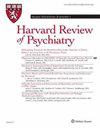Ketamine in the Treatment of Obsessive-Compulsive Disorder: A Systematic Review
IF 2.5
4区 医学
Q2 PSYCHIATRY
引用次数: 10
Abstract
Abstract Introduction First-line treatment for obsessive-compulsive disorder (OCD) includes exposure and response prevention behavioral therapy and serotonin reuptake inhibitors, particularly in combination. New and more effective treatments are needed, give that recent studies suggest that glutamatergic neurotransmission contributes to the pathophysiology of the disorder. In these circumstances, ketamine, as a potent N-methyl-D-aspartate receptor antagonist and glutamate modulator, offers alternative possibilities for OCD treatment. Methods This systematic review aims to investigate the effects of ketamine in OCD, following the Preferred Reporting Items for Systematic Review and Meta-analyses Protocols (PRISMA-P). Searches were carried out using the PubMed/MEDLINE, Embase, and PsycINFO databases. Results Nine articles were included, of which three were randomized controlled trials, three case reports, two open-label trials, and one a retrospective chart review. Reported data have shown a potential for fast onset of action and good tolerability of ketamine for OCD, even though the principal studies used only single-session racemic ketamine treatments, administered intravenously, and the results have been erratic. In addition, none of the available evidence demonstrates whether racemic ketamine, S-ketamine, or R-ketamine has the best efficacy in controlling OCD symptoms, and only sparse evidence suggests that a combination of ketamine and psychotherapy could benefit patients with OCD. Conclusion In order to advance clinical practice regarding the use of ketamine in treating OCD, future randomized, double-blind, placebo-controlled trials are required. These trials need to use larger samples to explore ketamine and its enantiomers, with different methods of administration, multiple sessions, and appropriate washout periods.氯胺酮治疗强迫症的系统评价
摘要引言强迫症(OCD)的一线治疗包括暴露和反应预防行为疗法和血清素再摄取抑制剂,特别是联合使用。鉴于最近的研究表明谷氨酸能神经传递有助于该疾病的病理生理学,因此需要新的更有效的治疗方法。在这种情况下,氯胺酮作为一种强效的N-甲基-D-天冬氨酸受体拮抗剂和谷氨酸调节剂,为强迫症的治疗提供了替代的可能性。方法本系统综述旨在研究氯胺酮在强迫症中的作用,遵循系统综述和荟萃分析方案(PRISMA-P)的首选报告项目。使用PubMed/MEDLINE、Embase和PsycINFO数据库进行搜索。结果纳入9篇文章,其中3篇为随机对照试验,3篇为病例报告,2篇为开放标签试验,1篇为回顾性图表综述。报告的数据显示,氯胺酮对强迫症有快速起效和良好耐受性的潜力,尽管主要研究仅使用静脉注射的单疗程外消旋氯胺酮治疗,结果不稳定。此外,没有任何可用的证据表明外消旋氯胺酮、S-氯胺酮或R-氯胺酮在控制强迫症症状方面是否具有最佳疗效,只有少量证据表明氯胺酮和心理治疗的结合可以使强迫症患者受益。结论为了推进氯胺酮治疗强迫症的临床实践,未来需要进行随机、双盲、安慰剂对照试验。这些试验需要使用更大的样本来探索氯胺酮及其对映体,采用不同的给药方法、多次给药和适当的冲洗期。
本文章由计算机程序翻译,如有差异,请以英文原文为准。
求助全文
约1分钟内获得全文
求助全文
来源期刊

Harvard Review of Psychiatry
PSYCHIATRY-
CiteScore
7.50
自引率
0.00%
发文量
67
审稿时长
>12 weeks
期刊介绍:
The Harvard Review of Psychiatry is the authoritative source for scholarly reviews and perspectives on important topics in psychiatry. Founded by the Harvard Medical School''s Department of Psychiatry, the Harvard Review of Psychiatry features review papers that summarize and synthesize the key literature in a scholarly and clinically relevant manner. Topics covered include: Schizophrenia and related disorders; Mood disorders; Personality disorders; Substance use disorders; Anxiety; Neuroscience; Psychosocial aspects of psychiatry; Ethics; Psychiatric education; and much more.
In addition, a Clinical Challenges section presents a case with discussion from a panel of experts. Brief reviews are presented in topic-specific columns that include Cross-Cultural Psychiatry, History of Psychiatry, Ethics, and others.
 求助内容:
求助内容: 应助结果提醒方式:
应助结果提醒方式:


